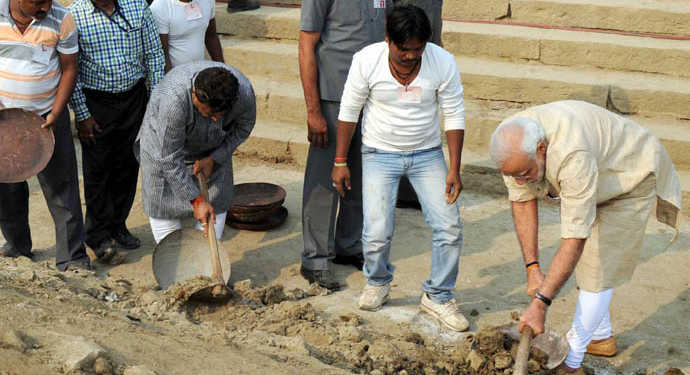A study carried out by the WHO into health gains emanating out of the Modi government’s flagship program Swachh Bharat Mission (Gramin) has concluded that it would result in avoiding more than 3 lakh deaths between 2014 and October 2019. The study was conducted by the WHO at the instance of Ministry of Drinking Water and Sanitation (MDWS) in order to make an assessment of the health gains resulting out of the flagship program.
The study which was released at the ‘Dissemination Workshop’, found clear evidence of improvement in drinking water supply, sanitation services and personal hygiene which had obvious and far reaching positive health impacts. WHO expert Richard Johnston said that, “it is estimated that SBM-G will result in averting more than 3 lakh deaths (diarrhea and protein-energy malnutrition) between 2014 and October 2019.” He further added that unsafe sanitation caused an estimated 199 million cases of diarrhea every year before the start of SBM-G in 2014. There has been a reduction in such cases every since the flagship program kick-started and it will almost be eliminated when universal use of safe sanitation facilities is achieved by October 2019. Apart from this, more than 14 million Disability-Adjusted Life Years (DALYs) were estimated to be avoided between 2014 and October 2019. MDWS secretary Parameswaran Iyer spoke about the report and said that, “This study which WHO has done for us shows that over the course of this program, by the time it is concluded by October 2019, over 3 lakh lives would have been saved. In addition, there have been several other significant health benefits.” He added that this is an important study which shows that the SBM goes well beyond just improving rural lives and makes it a ‘Jan Andolan’, having significant health impact and economic impact as well. The conclusions reached by the study indeed show that the program is revolutionary in nature and has transformed the rural life of India to an unimaginable extent.
The study also noted that India has made vast improvement since 2014 with household sanitation coverage jumping by over 13 per cent annually between the years 2016 and 2018. This comes as a great boost for the Modi government given that Swachh Bharat Mission has been one of prime minister’s favorite programs and he has been at the helm of affairs as far as Swachh Bharat Mission is concerned. He has been himself involved in this and has been time and again urging people to adopt safe sanitation practices. In rural areas, people have even been extended monetary incentives so that they could build toilets. With the massive ambition of ridding the nation of open defecation, the Swachh Bharat Mission was launched on October 2, 2014 and aimed to achieve its target by 2019.
The recent study on SBM-G has confirmed that the Modi government has been able to achieve what other governments could not have even thought of doing. This also comes as a severe jolt who were criticizing the Swachh Bharat Mission just for the sake of it. However, the immense success of SBM-G there is a definite improvement in the rural lifestyle. Diseases related to poor sanitation facilities and open defecation are soon going to become a thing of the past. This is, without a doubt, the biggest achievement of the Modi government. It has made sure that basic facilities like sanitation no longer elude the rural areas of the country. With this the Modi government has once again shown the ability to achieve desired results in a strictly time bound manner.



























